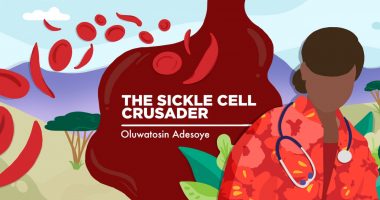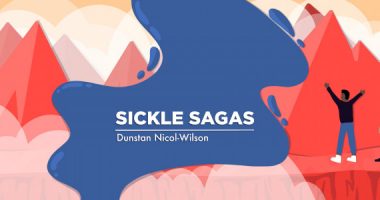Most patients free of vaso-occlusive crises for years after Casgevy dose
Patients experienced no painful crisis for average of more than 2.5 years

Most people with sickle cell disease (SCD) who received the gene-editing therapy Casgevy (exagamglogene autotemcel) in clinical trials have been free from vaso-occlusive crises (VOCs) over several years of follow-up, according to new data.
Vertex Pharmaceuticals, which developed Casgevy alongside CRISPR Therapeutics, shared the findings at the 66th American Society of Hematology (ASH) Annual Meeting and Exposition, held Dec. 7-10 in San Diego and virtually. The presentation was titled “Durable Clinical Benefits with Exagamglogene Autotemcel for Severe Sickle Cell Disease.”
Data specifically showed that, among 42 patients who received Casgevy in clinical trials and were followed for at least 16 months, all but three have been free from VOCs for at least 12 consecutive months. The mean time patients remained free from VOCs was more than 30 months (2.5 years), with some being VOC-free for nearly five years.
The three patients who have not been VOC-free for at least 12 consecutive months have experienced substantial reductions in the amount of time they’ve spent hospitalized due to VOCs, according to Vertex.
“Casgevy is changing the outlook for people living with sickle cell disease … with these data reinforcing the immense clinical value a durable one-time therapy can provide to patients,” Carmen Bozic, MD, chief medical officer and executive vice president of global medicines development and medical affairs at Vertex, said in a company press release.
‘Strong evidence’ for durability of beneficial effects following Casgevy
“These comprehensive data provide additional evidence of the benefits of eradicating … vaso-occlusive crises for those with sickle cell disease,” said Franco Locatelli, MD, PhD, professor of pediatrics at the Catholic University of the Sacred Heart of Rome, who presented the data at ASH. “With median follow-up around three years there is strong evidence for the durability of these beneficial effects following treatment with Casgevy.”
SCD is caused by mutations that lead to the production of an abnormal form of the adult version of hemoglobin, the protein that red blood cells use to carry oxygen through the bloodstream. The defective protein tends to form clumps inside red blood cells, deforming them and making them prone to getting trapped inside blood vessels and blocking blood flow. Disruptions in blood flow to tissues and organs, in turn, can lead to painful VOCs and other complications.
Casgevy works by modifying the DNA of blood cells so they will produce fetal hemoglobin, an alternative version of the protein that’s normally produced during fetal development and is more effective at transporting oxygen than its adult counterpart. The gene-editing treatment involves collecting blood stem cells from a patient’s bone marrow, engineering them in a lab, and then returning them to the patient via a stem cell transplant. The engineered stem cells are then expected to give rise to new red blood cells that are capable of producing fetal hemoglobin, which is then expected to help reduce the frequency and severity of VOCs.
The ASH presentation included data on SCD patients who received Casgevy as part of the Phase 2/3 CLIMB-121 trial (NCT03745287) and enrolled in its extension study, CLIMB-131 (NCT04208529). CLIMB-121 enrolled patients ages 12-35 who had experienced at least two severe VOCs per year in the two years before screening.
In addition to showing reduced rates of VOCs, the new data revealed that all patients who have been given Casgevy in the trials had stable levels of fetal hemoglobin. Measures of life quality also have improved following treatment.
Casgevy may ‘provide a one-time functional cure’ for severe SCD
“These results confirm the potential for [Casgevy] to provide a one-time functional cure to patients with severe SCD,” the researchers wrote.
In a separate abstract accepted at ASH, researchers delved more deeply into data on how Casgevy affected measures of life quality for patients in the trials. That abstract was titled “Health-Related Quality-of-Life Improvements after Exagamglogene Autotemcel in Patients with Severe Sickle Cell Disease.”
Results showed that, in adults who received Casgevy, clinically meaningful improvements in multiple measures of life quality were seen as soon as six months after the gene-editing treatment, and were sustained for at least three years after treatment. For adolescent participants, clinically meaningful improvements were seen as soon as three months following treatment.
Patients in all age groups saw improvements in many different aspects of health-related quality of life, and also reported substantial reductions in pain severity.
“These results demonstrate that [Casgevy] provides substantial and durable clinical benefit to adults and adolescents with SCD in [health-related quality of life] including physical, social/family, emotional, functional well-being, pain experience, and overall health status,” the researchers wrote.
Casgevy is approved in the U.S. for sickle cell patients, 12 and older, who are experiencing frequent VOCs. It has also been authorized in the U.K., European Union, and other regions. Vertex said it is working on applications to seek the approval of the therapy in the United Arab Emirates and Kuwait.
“We have a strong commitment to build on our progress in bringing Casgevy to patients around the world,” Bozic said.








